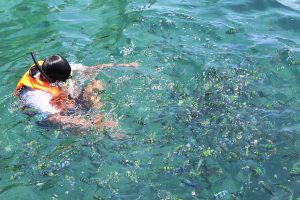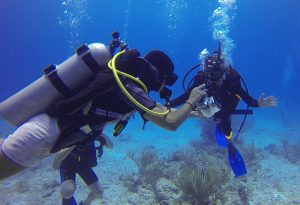 You’re a new diver and you just finished your Open Water Dive Certification not long ago. Now here you are, sitting on a dive boat with your friends who insisted you go diving with them.
You’re a new diver and you just finished your Open Water Dive Certification not long ago. Now here you are, sitting on a dive boat with your friends who insisted you go diving with them.
You’re experiencing feelings of seasickness, uncertainty about your dive skills, and wondering if you will remember everything you were taught.
Whether you’re new to diving or a novice diver, you are not alone in your feelings of doubt.
I’ll tell you the common fears divers have, what stress can do to your body, how to take control of the situation and how to deal with the fears and anxieties of scuba diving! It’s time to take charge and start managing the stresses so you can have fun underwater.
Common Diver Stresses
Stress is when you recognize the outcome of your non-fulfillment to be a priority. You over worry on things that you think might happen.
They can be positive or negative.
Positive stress can be like putting on a speech you’ve been waiting to do. It keeps you focused and in good, thinking, creative mind.
Negative stress can be the feeling of failure. Negative thoughts can take over your mind… it will control you if you do nothing about it. This is when it becomes dangerous because you panic. Panic can lead to death when you’re underwater!
While these are self-created, you perceive things to be while others are simply enjoying what they’re about to do or doing… diving.
Some of the conditions or perspectives that cause diver stresses are:
1) Cold
2) Fear
3) Equipment Malfunctions
4) Sick
5) Darkness
6) Can’t see dive buddy
7) Intimidation
8) Sharks
9) Disorientation
10) Currents
11) Not enough air
12) Tired
13) Not confident
14) Drowning
How can you recognize your stress?
 Stress affects your body in many ways when you have the feeling of being threatened. Not only do you become overwhelmed, your heart beats faster, your blood pressure rises and your muscles begin to tighten.
Stress affects your body in many ways when you have the feeling of being threatened. Not only do you become overwhelmed, your heart beats faster, your blood pressure rises and your muscles begin to tighten.
When you’re on a dive and you find yourself….
- Arms flailing and legs kicking fast
- Fast ascent
- Big ‘wild eyed’ look
- Fast breathing (hyperventilation)
- Removing regulator
- Quick, hasty movements
- Fixated on repeating things
- Imaginary gear problems
- Imaginary ear problems
- Stalling
If you have seen other divers do any of these or you know you have fallen into any of the above, you are stressed!
How to Overcome Your Fears by Managing Them
It would be nice to be able to live naturally in both domains, land and water… but this is not the case for us as humans.
So, the first thing you need to do is to recognize your fears… your stressors!
Know you!
Who are you? You should know your limitations, your fears..
1. What motivates you?
2. How do you learn?
3. Are you a peaceful person?
4. Are you a person who can be calm in stressful situations?
5. Do you have an optimistic or pessimistic outlook to life?
6. Do you have control of your life?
7. Who can you talk to?
If you feel you don’t have control of your life, you’re at the mercy of everything around you… your environment will be your threat. Being stressed in this stage will paralyze you. Everything that doesn’t feel right is a threat to you.
You need to recognize your stresses. Decide if they really are important, find the solutions and then act on them.
If you can identify and effectively handle your emotions, you will have a better tolerance toward stress.
Be prepared to dive.
1) Having a checklist helps. Did you bring everything? If you have the fear of being left behind, bring a dive sausage (an orange buoy) so you can be visible at the surface, storm whistle…whatever you need to get attention when you need help.
2) Check with the dive shop to see if the boat captain will have water bottles on the boat, if not bring your own. You don’t want to be dehydrated, so drink lots of water.
3) If you have a new mask, make sure you have removed the manufacturer’s release agents on the inside of your mask. Bring toothpaste or baby shampoo to prevent mask from fogging. Is your mask properly adjusted to suit your face?
4) Are you prone to seasickness or motion, make sure you take the medication as directed and before you board the boat.
5) Arrive early to the dive shop at least 15 mins so you’re relaxed. When you’re late and feel rushed, you’re already building up anxiety.
6) Talk to your tour guide and bring up any concerns or issues you may have. If you’re a new diver, it’s always a good idea to let the tour guide and your dive buddy know.
7) Go over hand signals with your dive buddy.
8) Practice..practice! If you’re unsure about things like how to clear your mask, how to equalize your ears, fear of water over your head, water entrance, fear of not being able to breathe underwater, fear of drowning and fear of failure… these can all be remedied by practicing.
Take a certified dive buddy with you and practice in a pool. Practice the skills you learned in your Open Water Dive Certification course or take the refresher course.
9) If it’s been awhile as in 3 years since your last dive, it would be wise to take the refresher course with a professional dive instructor. In fact, I see dive shops now want you to take the refresher course if it’s been 3 years and over …
10) If you have already vomited or feel close to it, talk to your tour guide and see if there is any way you can get off the boat. Do not enter the water and abort your dive.
If you’re not that close to throwing up … get into the water as soon as you can. Some divers feel this helps to get rid of that feeling of nausea.
Check out my 11 Best Ways To Prevent and Avoid Seasickness on a Dive Boat .
11) Get lots of rest.
This does not mean running just before and immediately after your dives.
Any kind of physical exercise will get your heart beating faster which then pushes the blood faster in your body which then increases the level of nitrogen in your body tissues. When you’re underwater, this increased nitrogen if you’re not able to lower it during your decompression stop can potentially cause you to be a candidate for decompression sickness.
Diving can be exerting. When you think about it, you’re already dealing with all that water pressure surrounding you.
Be familiar with your dive gear.
Whether it’s your own dive gear or rental, take a moment to check all the equipment. You should know where the dump valves are located, do you need to wear a weight belt, you should know how much weigh you need ahead of time, where is the inflator, deflator button, etc. Is everything in working order…
Determine the style of BCD if you’re renting… is it wing-style, back inflation or jacket style?
Seasick and Vomiting Underwater
First, my sympathy to you! Trust me, I know how you feel…!
If you already know you’re prone to being seasick or if motion bothers you, the feeling of nausea can be prevented before you enter the water. TAKE GRAVOL or similar at least 30 minutes prior to your dive or as directed.
Vomiting underwater may be dangerous because you might inhale water and choke. If you think you’re NOT that close yet to throwing up and feel you’re going to, here’s what to do…
1) Use the hand signal for ‘Something is Wrong’ … keep your hand flat, keep your fingers and thumb apart and palm facing down, and then rotate your wrist so that the thumb goes up and then rotate the thumb down and repeat. After that, you can use some other kind of hand signal like rubbing your tummy. Once your buddy understands your situation, he can then let the tour guide know.
2) Surface with your buddy.
3) NEVER VOMIT INTO YOUR REGULATOR! This may cause you to uncontrollably inhale with your mouth open which would then cause choking.
4) Vomiting underwater!
As a last resort… If you feel the urge to throw up is too strong and you can’t surface in time, take your alternate air source and press it against one side of your mouth. By this time, you should have the primary regulator out of your mouth. Press the purge button at the back of that alternate air source to instigate the free flow of air. This will allow you to breathe, throw up and keep the vomit out.
When you’re finished, put the alternate air source into your mouth, push the purge button to clear it and continue breathing. Once you’re back to feeling relaxed and normal switch back to your primary regulator, purge it and breathe. It would be a good idea to slowly ascend with your dive buddy and abort the dive.
Feeling Pressured to Dive
If you feel pressured to dive and you feel you’re not ready to dive for whatever your reasons are, don’t dive. You make the decision to dive or not to dive.
Discuss it with your dive buddy and if you still can’t resolve the feeling don’t dive. Remember it’s your life and your buddy’s life…
When you abort the dive, don’t feel defeated… if diving is what you want to keep doing, keep practicing or take a refresher course. The more dives you do, the confident you become!
Trust me… I actually retook my PADI Open Water Dive Certification course and what a difference. I have done over 800 dives now. I go on dive trips on my own because my friends don’t dive and it’s easy to find a dive buddy at the dive shop.
Fear of Sharks

1) Get educated on sharks. Do some research. Sharks are not man-eaters. They don’t hunt us. If you really think about it, sharks are victims to humans. We hunt them, cut off their tails and dump them back into the ocean to die an agonizing death.
When you hear of a surfer killed by a shark, we become paranoid and yes you hear it in the news on TV… Sharks attacks on humans are rare compared to thousands of people who die every day just from vehicle accidents.
Still, this doesn’t mean we shouldn’t be ignoring sharks …
Stay alert of your surroundings and always stay close to your buddy. Dive with your dive group. When you see a shark, remain calm, and observe its behaviour. Don’t make sudden quick moves like flailing your arms and making irrational kicks.
Respect the shark… remember you are in its territory. Abort the dive if you see threatening moves from the shark.
If you feel yourself panicking… remember to stop, breathe deep and slowly, then think of your best possible solution, and act on it together with your buddy!
Conclusion
Remember you never dive alone… if you travel by yourself find a dive buddy at the dive shop!
Your fears and anxieties can be controlled at the surface as well as underwater. It’s up to you! I remember one of my dive instructors saying ‘just think of me on your shoulders’ when you think you can’t do something and your anxieties are ruining your dives.
Stressed out? Heck no…
1) Stop, focus on taking deep breathes slowly, establish your buoyancy.
2) Control your thoughts.
3) Assess your situation.
4) Determine your best action.
5) Do it…
You’ll be amazed at how well you managed your fears and anxieties and before you know it, you will feel like an authority on this and help over divers like you.
I remember seeing a student on the dive boat. She sat on the edge of the boat to do a back roll entrance into the water. She froze and every time she looked over her shoulder and looked down at the water below her, things got worse and she started to shake… her instructor asked if he could assist her by gently giving her a push. She took a deep breath and quickly said yes… I can still remember to this day, her laughter and her saying ‘that was so easy’. She accomplished her fear…
I hope I was able to help you here and if you have had any experiences relating to dive fears and anxieties you would like to share or have comments or questions, I really would like to hear from you. You can put them in the comment box below.
Thank you!

It’s all starting to make sense now..
I wonder, if there’s a special training involved to prevent sea sickness? Throwing up under water isn’t exactly what you train for, but if it happens, you’d better be ready..
..& the fear of drowning, perhaps the most prominent one of the bunch.
Physical prowess is likely the least of our worries..
..mostly, everything else seems to be related to mental toughness – The psychological aspects of diving.
I suspect, scuba diving is one of those situations where no one can talk you out from it, no matter how good they do it, if it’s safe or not.. you just get the theory down for A+ & then dive in, head-first, to get yourself more familiar with the surrounding environment. No sugar coating here. Is there?
Seems like the mainstream fear are still sharks..
I highly doubt it is among professional divers?
I’d be much more scared of poisonous snails & small fish, all the sharp rocks & spikes on the bottom of the sea..
& even more so, a floating algae, where you can realistically get stuck – Let’s say you’re trying to surface, you don’t look up & swim right into one.
I’m sure it’s also rare, but every once in a while, we hear some new story.
Scuba diving takes the “keeping your calm” game to the whole new level.
Hi Henry,
Thank you for your comment! Prevention of sea sickness is a matter of being prepared ahead of time. Even in our younger years of going to a circus and riding even a merry go around… if you remember getting sick, it’s already a sign you’re prone to motion sickness. Perhaps a person can get hypnotized….
The fear of drowning can be diminished by taking swimming lessons and practicing more dive skills in shallow water with a dive buddy.
With sharks, the diver should know the shark swimming habits when it feels threatened, and how the diver should respond. The more shark education the diver gets the better.
We learn all the standard hand signals during our Open Water Dive Certification.
If you are a relaxed diver, the feeling underwater is very peaceful!
Great post!
I have only been diving 4years and while I am now quite experienced I still remember the early days when things were really quite terrifying! I Honestly wish I had had this sort of advice and encouragement while I was learning.
Diving Stress like all things diminishes with experience but Its so important to manage it in the early days if you want to carry on with your diving!
And having dived Multiple times (intentionally) with Sharks I completely agree with you advice on them. they are not to be feared just respected and admired!
Hi Steve, thank you for your awesome comment! I remember too when I first got my Open Water Dive Certification… the feeling of anxiety certainly did stick for awhile. The more I went diving the better I felt. I’m glad to hear you have done a lot of dives and diving with sharks too… good for you! Isn’t that a wonderful experience? I hope our paths will cross…
Regards,
Monica